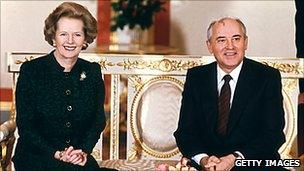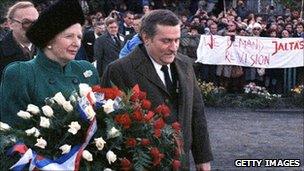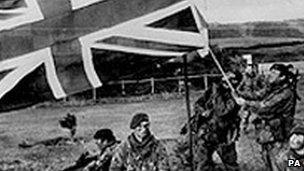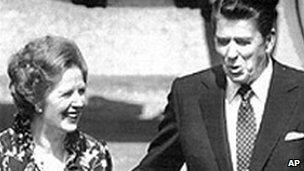Iron Lady on the world stage
- Published

The Iron Lady fascinated people in the former Soviet Union
It is difficult these days to understand the appeal Baroness Thatcher had among people struggling to throw off communist rule in Europe during the 1980s.
It was her implacable opposition to communism that earned her the title The Iron Lady.
For me the appeal became vividly apparent one day in November 1988 when she was on a visit to Poland.
At the time the Polish government was trying to maintain an uneasy balance between loyalty to Moscow and giving its people more freedom.
Cheering crowds
The visit began with the Polish President Wojciech Jaruzelski, sporting dark glasses as always, showing her the promontory in Gdansk where the German bombardment of the then-named city of Danzig started the war in 1939.
It was polite, diplomatic stuff but there was no warmth, no meeting of minds and no smiles.
Contrast this with her subsequent visit to the shipyards in the same city, where the Solidarity movement had grown and strengthened.
With the Solidarity leader Lech Walesa at her side, Mrs Thatcher was given a thunderous reception from thousands of hard-hatted and hard-handed ship workers.

With Solidarity leader Lech Walesa
They not only filled the square, where a monument to those killed in protests had been erected, but were perched on buildings, walls, lampposts and vehicles.
The noise was huge and she just stood there, beaming.
For these workers she was the symbol of freedom. It was a long way from the bitterness of the British miners whom she had defeated a few years earlier.
I witnessed a similar event a couple of years later in the then Soviet republic of Armenia, which had suffered a terrible earthquake in 1988.
The British government had, as part of its aid, built an earthquake-proof school in Leninakan - it was named after Lord Byron, who thought highly of the Armenians.
It was a very fine building, standing among many untouched earthquake ruins, and Mrs Thatcher came to open it.
There were such vast crowds cheering her that one of her officials told me he thought they were the biggest she had seen on any of her world visits.
Again, to them she was a sign of a better life. They did not care for her problems at home, then beginning to grow.

1,000 British and Argentine troops died in the Falklands war
They saw her, as the shipyard workers in Gdansk had done, as someone who had stood up to their rulers and had shown that there was another way.
Her first major foray on to the world stage came when the military junta ruling Argentina suddenly invaded the Falkland Islands, territory that Britain had occupied since the 19th Century but which Argentina had always claimed.
The junta was delighted. Its leader General Galtieri took the salute of his supporters from the balcony of the Casa Rosada in Buenos Aries as Mrs Thatcher fumed and sent for her naval chiefs.
It was a bloody little war. There were nervous moments for the Royal Navy when daring Argentine Air Force pilots hit ship after ship.
But when the Union flag was flying again over Port Stanley, Margaret Thatcher was established as a determined leader who was to go on to make her mark on the wider world.
Special relationship
Two factors helped propel her into history: One was her alliance with her soulmate Ronald Reagan, who had become US president in 1980.
Thus was added to her armoury the clout of the United States and the rhetoric of the "Great Communicator".
The second was the profound change through which the Soviet Union was going.
It is likely that the Soviet system would have collapsed anyway at some stage, but Mrs Thatcher and Mr Reagan were there to give it a shove and probably hastened its end.
Mrs Thatcher had shown her diplomatic acumen when, in 1984, she met Mikhail Gorbachev in London before he took over the Soviet Communist Party.
She declared: "I like Mr Gorbachev. We can do business together."

Thatcher and Reagan were political allies and personal friends
The business they did together was the dismantling of communism.
Her foreign policy, however, also had its problems.
Perhaps the biggest was over South Africa, in particular her resistance to sanctions against the white minority government.
This led to some fractious meetings of the Commonwealth.
At the 1987 meeting in Vancouver, one could feel the hatred for her among other leaders.
Typically she hit back, instructing two of her senior officials at one stage to lay into the Canadian hosts for increasing their trade with South Africa.
The Canadians were shocked at such tactics.
She herself blandly expressed some wonderment that others did not like getting the "medicine they dished out".
Europe
At one press conference, asked about a threat by the African National Congress to retaliate against British citizens, she declared that this was the action of a "typical terrorist organisation".
It was no surprise therefore that Nelson Mandela was not her favourite South African leader.
She made few friends in the European Community either, with her "handbagging" and insistence on a rebate for excessive British budget contributions.
Her heart was not in an ever-closer union with Europe.
She regarded her free-market philosophy as something that gave Britain - and herself - a role in the world as a whole.
And in the final days of her own rule, she was still as firm as ever, giving advice to Mr Reagan's successor, President George Bush Senior.
At a meeting shortly after Saddam Hussein invaded Kuwait in the summer of 1990, she thought Mr Bush might be wavering in his response.
She told him not to "go wobbly". Rightly or wrongly, she never did.